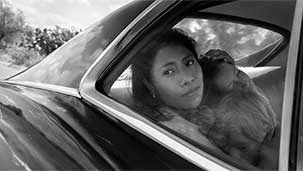Dear Fellow Critics,
We often get more attention for the films we choose to tear apart than the films we choose to champion. It’s a hard balance to maintain. If we pile on the praise too often, we get tuned out. If we go the other way, we’re simply being contrarian. But on the spectrum between Peter Travers and Armond White, there are many of us who put a lot of thought into where we plant our flags (kinda like Damien Chazelle—haters can go to hell). So, the question is: how do you know when a movie is truly worth championing?
I think I’ve finally figured it out. For me, it’s really very simple: it’s when I need to rewatch the film with my wife.
That’s it. I don’t have to overthink it anymore. After making lists and writing essays for seven years, I’ve finally found the common denominator that unites all the movies that have transcended my own personal preferences (genre, director, actors, subject matter, etc.) and become an experience I just have to share with the world: and those are the films that I want to share, first and foremost, with the person I love most in the world.
I think Alfonso Cuarón feels the same way. He knew he had something important to say about growing up in Mexico City, and yet he wouldn’t share the full script with anyone. He obviously didn’t trust his own Oscar-winning instincts to communicate, on the page, the depths he hoped to reach with the finished film. Which is understandable. Because there’s nothing exceptional about the story of Roma—nothing, at least, that is objectively worth hanging a feature film on. In fact, I still have a hard time summarizing the plot. “Basically, it’s about a nanny/housekeeper who lives with a middle-class Mexican family in the 70s and—the film just kind of follows her around for a year,” is how my pitch to my wife went. “Oh, and it’s black and white. With subtitles. And it’s on Netflix, but we’re going to get a babysitter and pay money to see it in the theatre.”
Luckily, she trusted me. I went to bat for the movie, and she was along for the ride. Same can be said about Netflix’s confidence in Cuarón. Not many directors can inspire that kind of trust. Fewer still can pay if off. But, with Roma, a production studio that usually makes its creative decisions based on viewing algorithms decided to forgo data-driven logic and park an auteur’s Ford Galaxy-sized confidence into an insanely narrow awards space. It was a calculated gamble that turned out to be worth all the dogshit they went through to get there. Sure, it will probably result in a dozen more star directors awkwardly crashing in attempts to prove themselves equal. But, in this case, it was more than just a good fit of director and material—it was a gift that Cuaron gave his family, his supporters, and his country.
Any country should be so lucky as to have their own Roma. Recreating a mood and era has rarely ever felt so epic and effortless. Taking over from his master cinematographer – Emmanuel Lubezki, he of the wandering eye-of-God approach – Cuarón’s camera is always grounded (never floating), either fixed with simple pans and tilts, or using lengthy dolly track movements to draw us into the film’s most compelling moments. It’s much less showy than Lubezki; the camera communicates scale rather than choreography, and allows us to feel like the world beyond the frame continues into infinity. A simple scene of someone running down the street, for example, allows us to marvel at the depth of of the cross-streets, and makes you believe that La Roma is a neighbourhood in Mexico City that must still exist exactly as you’re seeing it (even if, evidently, it does not).
In the foreground throughout are several non-actors, among them the lead, Yalitza Aparicio (who can now safely add “actor” to her resume after earning a Best Actress Academy Award nomination), who’s strongest asset is not so much acting as it is reacting, both to small intimate moments (such as a befuddled grin during a nude martial arts performance) and cataclysmic events (like a full-scale riot breaking out during a shopping trip, or an earthquake during a hospital visit, or a forest fire that encroaches on a family retreat, or the near-drowning of a child). In fact, laying out all these plot points, Roma seems almost melodramatic (and I’m leaving out the most affecting scene in the whole film). But in none of these scenes do the external forces of nature overwhelm the human element at the centre.
Roma is one of two truly great humanist films to come out this year that prioritize a triumph of spirit. But even Shoplifters is a more tightly-plotted story. In Roma, the seeming looseness of the narrative and unaffected mannerisms of the cast, along with the wildly detailed production design and rich black and white cinematography, creates a perfect alchemy that cannot, and will not, be repeated. Frankly, it should have been unachievable in the first place.
But Cuaron knows (and now I do, too) that when you believe in something, you just have to go for it, and trust others come along.
Sincerely,

Christopher




